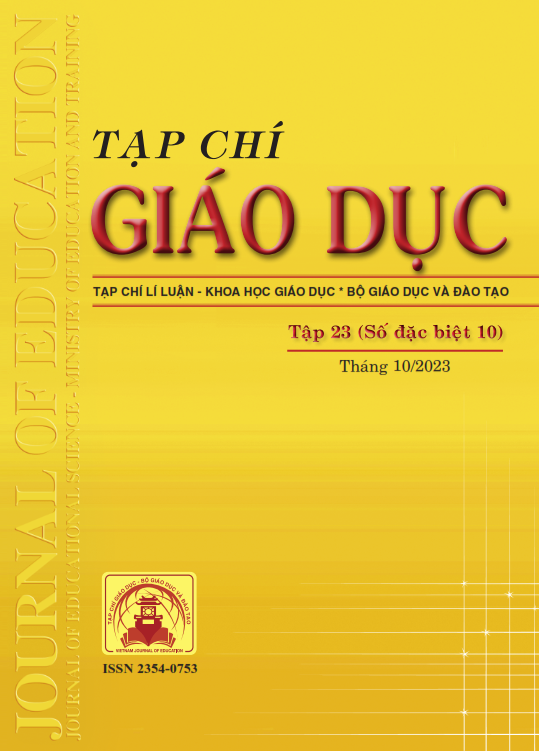Sử dụng bối cảnh địa phương trong tổ chức hoạt động vẽ theo đề tài cho trẻ mẫu giáo 5-6 tuổi
Tóm tắt
Context-based education is an approach that can help learners learn meaningfully through the connection between lessons and learners' experiences in their everyday lives - where educators take factors and events in the surrounding life as objects to guide the cognitive process to help learners study, and at the same time learners actively apply their knowledge to solve real problems. In the world as well as in Vietnam, research on this approach tends to focus more on the high school level, so there is still a lack of research and articles on this educational approach at the preschool level, especially in organizing children's drawing activities - an activity that is loved by all children. This study points out some manifestations of using local context in organizing themed drawing activities for 5-6-year-old preschool children in kindergarten, and proposes 4 measures to organize them effectively. The research contributes to deepening the theoretical framework of context-based education and points out the direction for applying this approach in other educational activities for preschool children, thereby strongly promoting the philosophy that educators around the world believe in, that is education should be based on life, education for life.
Tài liệu tham khảo
Bamford, A. (2006). The wow factor: Global research compendium on the impact of the arts in education. Waxmann Verlag.
Boyd, D. (2019). Utilising place-based learning through local contexts to develop agents of change in Early Childhood Education for Sustainability. Education 3-13, 47(8), 983-997.
Đỗ Thị Bích Thủy (2018). Chủ đề văn học địa phương trong trường phổ thông (Khảo sát qua chương trình văn học địa phương các tỉnh duyên hải phía Bắc). Tạp chí Khoa học, Trường Đại học Thủ đô Hà Nội, 25, 53-63.
Garhart, M. (2016). Các lí thuyết về trẻ em của Deway, Montessori, Erikson, J.Piaget và L.X.Vưgotxki (Nguyễn Bảo Trung dịch). NXB Lao động.
Hamilton, A., Jin, Y., & Krieg, S. (2019). Early childhood arts curriculum: A cross-cultural study. Journal of Curriculum Studies, 51(5), 698-714.
Hoàng Phê (chủ biên, 2021). Từ điển tiếng Việt. Viện Ngôn ngữ học. NXB Hồng Đức.
Mcilroy, T. (2022). The Stages of Drawing Development in Children: 0-6 Years. https://empoweredparents.co/child-development-drawing-stages/.
Morgan, A. T., Murray, E., & Liegeois, F. J. (2018). Interventions for childhood apraxia of speech. Cochrane Database of Systematic Reviews, 5(5).
Ngô Vũ Thu Hằng (2016). Giáo dục dựa vào bối cảnh. Tạp chí Khoa học, Đại học Quốc gia Hà Nội, 32(3), 11-17.
Nguyễn Vũ Hảo (2012). Triết lí giáo dục của John Dewey và những điểm gợi mở cho việc cải cách căn bản nền giáo dục ở Việt Nam hiện nay. Kỉ yếu hội thảo quốc tế Việt Nam học lần thứ 4, tr 89-101.
Sutaphan, S., & Yuenyong, C. (2019). STEM education teaching approach: Inquiry from the context based. Journal of Physics: Conference Series, 1340(1), 012003. IOP Publishing.
Taber, K. S. (2020). Mediated learning leading development—The social development theory of Lev Vygotsky. Science education in theory and practice: An introductory guide to learning theory, 277-291.
Vũ Thị Ngọc Minh (2022). Tổ chức hoạt động tạo hình cho trẻ mẫu giáo phù hợp bối cảnh địa phương. Tạp chí Khoa học Giáo dục Việt Nam, 18(7), 61-66.
Ye, Y. H., & Shih, Y. H. (2021). Development of John Dewey’s educational philosophy and its implications for children’s education. Policy Futures in Education, 19(8), 877-890.
Đã Xuất bản
Cách trích dẫn
Số
Chuyên mục
Giấy phép

Tác phẩm này được cấp phép theo Ghi nhận tác giả của Creative Commons Giấy phép quốc tế 4.0 .












